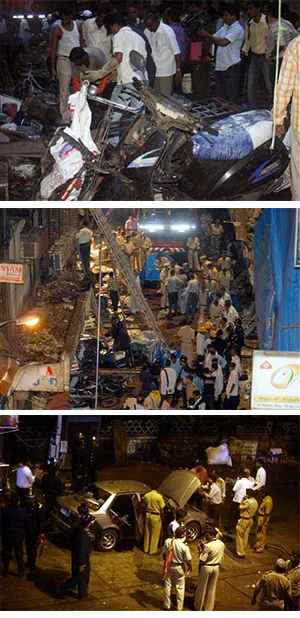Mar 03, 2026
Mar 03, 2026
Much has been written about the Mumbai 13/7 serial bomb attacks, which took place on 13th July less than a week ago and why these happened. India’s and in turn Mumbai’s gaping security holes have been thoroughly exposed for the nth time now. Is there any hope of redemption of the situation? Well frankly and sadly the answer is NO despite all the statements that have been made by the highest ranking ministers and officials including Dr Man Mohan Singh, India’s Prime Minister who may be having the dubious distinction now of having presided over the largest number of terrorist attacks in the country both in terms of incidents and casualties. Yet despite these ignominies India and Mumbai faces the threat of another major terrorist attack. Sadly it is not will it happen but only when? Here is why?
| Mumbai is at the mercy of another hidden power centre, the criminal dons who are alleged to have assassinated an investigative journalist recently and who rule the other part of the political economy the underground one. |
Political consensus is a primary requirement for launching a viable counter terrorism campaign. This comes from political will and leadership to bring together all parties on a common platform. The shenanigans immediately after 13/7 denote that there is hostility rather than consensus this time around. The primary challenge here is leadership, something that was demonstrated by say Rajiv Gandhi when he reached out to pen the Longowal Accord in Punjab and the Mizoram Accord. While the former did not work out as planned, the latter has brought about peace and tranquility in the North Eastern state which has remained in place to this day.
 Today it is evident that those who are in positions of power are not leaders but only political and bureaucratic managers who cannot reach out to the opposition seeking their assistance for being seen as weak.
Today it is evident that those who are in positions of power are not leaders but only political and bureaucratic managers who cannot reach out to the opposition seeking their assistance for being seen as weak.
What is even more dangerous is that parties are taking very contradictory positions in naming and shaming terror in their attempts to play populist politics thereby sheltering the miniscule minority which supports extremism. Isolating this minority regardless of community and religious affiliation is important but political managers are only adding to the confusion by attempting to colour the larger community or organizations that represent these. This is extremely hazardous and is sending the wrong signals.
The situation in Mumbai is even worse. Here the Chief Minister openly blamed a coalition partner, Nationalist Congress Party’s Home Minister for slackness in combating terrorism. This was open blame game of the worst kind which is likely to strain relations between the two parties in the State leading to lack of cooperation on the counter terrorism front in the days ahead.
Then there are the local satraps the Shiv Sena and the Maharashtra Navnirman Sena, who have a strong control of the political economy of India’s commercial capital and dictate how public services are delivered, how small businesses are run and how the big corporations as well as the entertainment industry, the pride of Mumbai function. Thus obeisance by many business leaders and film celebrities to Bal Thakre the patriarch of these two local parties directly as well as indirectly is essential. For them effective law and order and rule of government is anathema for that will control and contain the present state of virtual anarchy of local governance in Mumbai disrupting roots of their politics.
Mumbai is at the mercy of another hidden power centre, the criminal dons who are alleged to have assassinated an investigative journalist recently and who rule the other part of the political economy the underground one.
Functioning in an atmosphere of laissez faire governance, the Mumbai police can be hardly expected to deliver normal law and order much less effective counter terrorism which takes some amount of discipline and dedication to implement professionally without any interference from political bosses and vested interests as the mafia dons. So what we have is Mumbai police officers cornering some of the best real estate in the city under police housing schemes, pandering to media and mafia dons and neglecting their professional duties towards the citizen. This culture is unlikely to change in the near to immediate term thus expecting results from the Mumbai police or national agencies supporting them in building counter terrorism capabilities in the short term will be highly optimistic.
Poor management capability is also evident with even the Maharashtra Chief Minister complaining that he is unable to buy closed circuit television cameras because of systemic road blocks. Obviously there is bureaucratic inertia to accompany political ineptitude. The situation appears to be dangerous to say the least.
The terrorist groups and their handlers thrive on just such inefficiencies in the system from top to bottom to strike and Mumbai provides them this environment.
So is there any way out for the poor citizens of India’s vibrant, enervating and prosperous Maximum city, the hopes are only in the rise of a new administrative leader who can take it beyond the current morass, in the mould of Rudy Giuliani who when New York was in a similar situation as Mumbai in terms of law and order if not terror a few decades back brought back order to America’s maximum city. The Mumbaikar may have to await the rise of their own Rudy to be rid of terror.
Images (C) Gettyimages.com
17-Jul-2011
More by : Col. Rahul K. Bhonsle